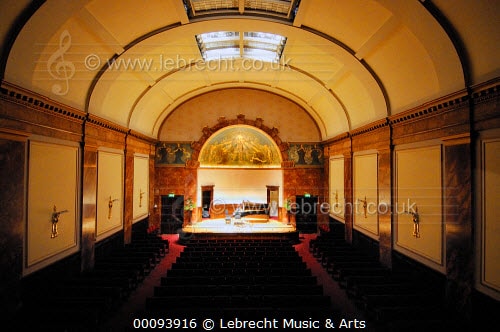Orchestra Santa Monica has picked Roger Kalia, one of the new crop of Solti Foundation US grant recipients, as its music director.
Kalia, 33, is assistant conductor at the Pacific Symphony.
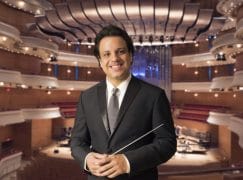
The Solti gift keeps on giving.
Orchestra Santa Monica has picked Roger Kalia, one of the new crop of Solti Foundation US grant recipients, as its music director.
Kalia, 33, is assistant conductor at the Pacific Symphony.

The Solti gift keeps on giving.
The Buffalo Philharmonic is advertising for an Assistant Conductor, Community Engagement to provide professional services for the Buffalo Philharmonic Orchestra and function as a key member of the artistic team.
So far, so good.
The successful candidate must have a thorough knowledge of orchestral repertoire, conducting experience, a commitment to equity, inclusion and diversity in the arts, command of the English language and the interest and ability to expand and build connections for the BPO within the Greater Buffalo community.
Seems ok.
ELIGIBILITY:
This position aims to create a significant work experience for a qualified musician of, but not limited to, African-American or Latinx descent.
Interesting. Probably just about legal.

This video comes from rehearsals of The Nose in Moscow, 1975.
Also in the front row: Irina and Maxim Shostakovich.
Wonderful to hear those voices.
Gennady Rozhdestvensky died this weekend, aged 87.
The death was announced today in Moscow of the unforgettable Gennady Rozhdestvensky. He was 87.
Making his Bolshoi debut in 1951, he conducted all over the world, serving as chief conductor of the BBC Symphony Orchestra, the Vienna Symphony and the Royal Stockholm Philharmonic.
Back home, he conducted Schnittke symphonies in the provinces when his music was banned in major cities and did much to advance two generations of non-conformist composers.
But he never spoke out against the Soviet regime, accepted its highest honours and lived comfortably within the system.
Orchestras loved him for not using all of his rehearsal time, saving the best for his concerts.
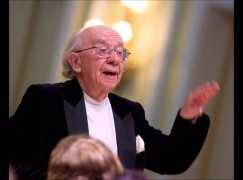
He was married to the pianist Viktoria Postnikova.
UPDATE: Rare video: Rozhdestvensky with Shostakovich.
Apart from Barenboim?
This is Sir Antonio Pappano with Kirill Gerstein in Munich this week, knocking off a Rachmaninov waltz.
Pavarotti remembers:
Treasure them both.
I glanced down the right-hand sound of the screen and found that these are some of my top pre-selects.
I must be more eclectic than I imagined.
Even stranger than I feared.
From the Ruhrtriennale:
The concert of the Young Fathers advertised for the 18 August in the Turbinenhalle Bochum as part of the Ruhrtriennale is not to take place. This decision was preceded by a request by the Ruhrtriennale that the band distance itself from the campaign “Boycott, Divestment and Sanctions” (BDS).
The Ruhrtriennale’s Artistic Director Stefanie Carp: “Regrettably, the Young Fathers have not distanced themselves from BDS. We explicitly do not conclude from this that the band is anti-Semitic, and, in this context, I consider it important to emphasise that criticism of the policy of the current Israeli government is not per se equivalent to anti-Semitism. However, the Ruhrtriennale distances itself in all forms from the BDS movement and wishes to have absolutely no connection with the campaign. We have therefore decided to cancel the concert. We regret this immensely, because the Young Fathers would have set an important tone in the programme of the Ruhrtriennale.”

Tickets already purchased will be refunded by the Ruhrtriennale. Therefore tickets can be returned at the ticket selling points they were purchased.
One of the last acts of City Opera before it collapsed under George Steel’s management was to attempt crowdfunding, seen as a desperate act for an established company.
Now it looks as though the revived City Opera is getting into trouble again with an uninspired appeal.
Read this:
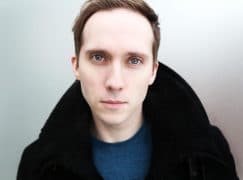
From the Lebrecht Album of the Week:
Averse as I am to teenage prodigies, I heard Daniel Lozakovich in a Berlin nightclub this week and had no doubt from the first touch of bow on string that he is the genuine article. Sixteen years old, raised in Stockholm by Kazak-Russian parents, he gives the impression of belonging nowhere but some deep place inside himself. Fresh from a sleepless night on a bench in Tokyo airport where his flight had been cancelled, he draws energy — as the great ones do — from an audience. No-one breathed on the dance-floor during his Bach Partita.
His DG debut recording is…
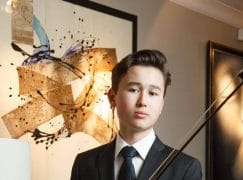
Read on here.
And here.
Our diarist Anthea Kreston is aspirating between quartet tours:
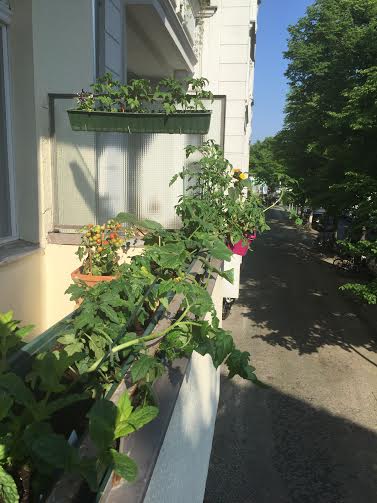
The end of our whirlwind Asia tour, with concerts in Hong Kong and Japan. The repertoire we played was substantial – Beethoven Op 18/3, Mozart Dissonance, Mendelssohn Op 44/1, Janacek “Kreutzer”, Schumann 1, Schumann 3, Shostakovich 7 and a Bach Chorale for encore (if we didn’t choose from the repertoire above). 7 works, 11 days, Korea, Hong Kong, Taiwan, and Japan. The stress on mind and body is extreme.
I have landed back into my life in Berlin. My girls are wrapping up their school year (Kindergarten and 2nd grade), so are my chamber groups at the Universität der Künste Berlin, where we are weeks away from final concerts. In two days, my Quartet heads back to the studio for our next round of recording for our upcoming Shostakovich CD for Erato/Warner with Tonmeister Christoph Franke. By this time next week, our next tour – Poland, Germany and Switzerland – will have begun.
I am catching my breath, walking in the woods and around the lake behind our home and doing the things which ground me – cooking, gardening, and hanging out with family and friends. When I wake up at 4:30 AM with jetlag, I just get up and do stuff (the girls will wake up in a couple of minutes, and I have root vegetables in the broiler, a pot of soup on the stove, breakfast ready, and have weeded, attacked and trained the huge patch of blackberries in our back yard. My arms (knock on wood) seem mainly mended from my double tendinitis. The best advice I got was to find a path which involved playing and healing simultaneously. Yoga (lots of it), cold/heat, ibuprofen, and swimming. I’m not all the way back yet, but I am close.
When I am exhausted (jetlag), overwhelmed (high-pressure concerts, lots of repertoire), in a new situation (new country, foods, schedules and customs), I have to be on the look-out for surprise attacks of stage anxiety. In general, I am a pretty cool character, and can lay down consistent, passionate and fairly perfect performance. I have a lot of natural energy and resilience, which I think may be genetic, or might have to do with my personal optimism problem. I had to figure out how to do this – to balance passion, engagement, consistency, and communication with a blanket of calm and a reserve of emergency energy in case a situation presented itself during a performance (an immediate injury or sickness, a colleague in distress, a strange environmental factor like lights, temperature or an iPad snafu).
When I walk out on stage, I am blinded by the light, by the oppressive feeling of hundreds of eyes and the constricting feeling of audience expectations. I try to make eye contact with members of the audience, but if the hall is too distant or lights too dark, this makes me feel even more on the spot. I am instantly in “fight or flight” mode, even though I do this all of the time, anticipate it, and try to rationalize myself out of it. It is simply something that happens on an animal level, and which I must gain control over. My breath feels cold, I can’t properly focus my eyes, and my brain is going simultaneously very fast and staying still. I plant my feet, get into position, and begin. The first movement of any concert is a time for me to calmly check in on my basic body functions one at a time, and to get each one under control.
There are four main things I try to get under my belt before the second movement. These are; realize I am who I am, something is going to go wrong, I know how to do this, and people are here to enjoy themselves. As these things become integrated, I slowly begin to come out of myself and relax into the experience. If, for some reason, things begin to go wrong, I lock it down, retreat into the Keep of the Castle, and perform with a surgical precision until all systems are up and running. I completely chill out for a half a page, then one-by-one I check my main systems, and when all is safe, I return to the Castle.
Oh – and also – I try to eat something really crunchy like a carrot or pretzel before I go on stage. Something that will stick in my teeth for a while. That way, if I feel like I want to do something other than what I am doing at that moment, I can just work at trying to get some carrots out of my molars. Works every time. Give it a try.
Wigmore Hall will give all five song finalists at next year’s BBC Cardiff Singer of the World a London debut recital.
John Gilhooly, Director of Wigmore Hall, says: I am very much looking forward to chairing the Song Prize Jury for Cardiff Singer of the World. The competition has continued to go from strength to strength in recent years, and it is an international force for good in terms of championing the art of the song recital. The artists taking part in the competition are consistently excellent, and I look forward to giving debut Wigmore Hall recitals to the five Song Prize finalists.
